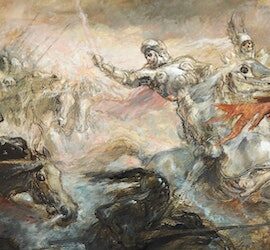
What led the Ottoman Empire to switch from being Britain’s ally to joining Germany before World War I? How did the complex web of European alliances contribute to one of history’s deadliest conflicts?
The Ottoman Empire before WWI found itself caught in a dangerous game of shifting alliances and imperial ambitions. European powers competed for territory and influence, while nationalism rose across multiple regions. These dynamics ultimately reshaped both the Middle East and Europe.
Keep reading to discover how the decisions of empires and the consequences of their choices changed the world forever.
The Ottoman Empire Before WWI
Fromkin discusses the Ottoman Empire before WWI, explaining that, at this time, Europe and Asia’s major powers frequently shifted alliances. He notes that these changes paved the way for the conflict between the Allies (the British Empire, France, and Russia) and the Central Powers (Germany, the Ottoman Empire, and Austria-Hungary). These alliances contributed to the Ottoman Empire’s collapse, reshaping it into the modern Middle East.
(Shortform note: Fromkin highlights the Ottoman Empire’s collapse and the rise of the modern Middle East, but World War I also reshaped Europe. New European states, such as the Weimar Republic and Austria, formed after the Austro-Hungarian, German, and Russian empires fell.)
We’ll discuss these shifting alliances in the context of the “Great Game,” a 19th-century imperial competition among Britain, France, and Russia. We then examine Europe’s policy changes toward the Ottoman Empire as the “Great Game” evolved. This led the Ottomans to join the Central Powers.
Essential Context: The Great Game
Fromkin argues that the pre-war period (late 19th and early 20th centuries) was the peak of imperialism for European powers. The British Empire’s “Great Game” aimed to block France and Russia’s colonial objectives in the territories between India and England. The wealth of natural resources the British Empire was extracting from India made the region its crowning jewel—and they protected it fiercely from competing empires’ advances.
(Shortform note: The British Empire’s economic and military success was tied to India. India provided the empire with raw materials and a massive—and inexpensive—labor force, in addition to buying 60% of the products the British made with those raw materials. Indian soldiers also participated in various colonial conflicts and served as a strategic reserve for Britain.)
Britain protected the territorial integrity of the Ottoman Empire to safeguard its Indian colonies, using the Ottomans as a buffer against Russian expansion. This strategy served British interests and helped the Ottomans defend against Russia. Once a major power, the Ottoman Empire flourished in the 16th century but began declining in the 17th century. Fromkin argues that the Ottomans were vulnerable to foreign intervention because they failed to shift from conquest to governance. The empire faced nationalist uprisings and lagged behind Europe in military, industrial, and administrative development, struggling to maintain peace and defend its borders.
(Shortform note: Fromkin’s depiction of the Ottoman Empire suggests he supports the Ottoman decline thesis: that the empire peaked in the 16th century before entering a long period of stagnation. However, many modern scholars reject the decline thesis, arguing it ignores the unique conditions within individual European and Ottoman states. This can lead to misconceptions about the Ottomans lagging behind Europe in all areas, a view some scholars believe promotes negative stereotypes about Islamic society. Critics also highlight evidence of the Ottoman Empire’s continuity and adaptation, viewing these as signs of resilience.)
Key Decisions: Europe’s Policy Shift Regarding the Ottoman Empire
Fromkin notes that Europe’s view of the Ottoman Empire changed at the start of World War I. We’ll explore these changes by describing Germany’s role before the war, how the Allies’ closer ties isolated the Ottomans, and how Ottoman land became a bargaining chip.
Europe’s attitude shift happened as the threat of war grew. Germany’s industrial and military rise challenged Britain’s dominance, impacting strategic and economic dynamics. Fromkin explains that Britain’s weakening industry and Germany’s advancements in chemicals, tools, and railroads threatened British interests.
| Did the Great Game Lead to the Great War? Fromkin places the lead-up to World War I in the context of the Great Game, but he stops short of saying it caused the war. By contrast, in The Silk Roads, Peter Frankopan claims Britain’s Great Game strained relations with Germany because Britain allowed Russia to compete against Germany for territory in Central and Eastern Europe in exchange for Russia limiting its Asian ambitions. The resulting hostility played a key role in triggering World War I. However, other scholars view the war’s origins differently. German historian Fritz Fischer argues in Germany’s Aims in the First World War that Germany intentionally started the war to expand its territory. Fischer presents documents showing Germany’s plans to annex parts of France and much of the Russian Empire if it won the war. He argues Germany’s economic growth fueled its expansionism since it needed new markets and resources to keep growing. |
As Germany became a new imperial force, Britain sought alliances with old enemies, unsettling the Ottoman Empire. Britain and France solidified their alliance, while Britain resolved tensions with Russia through a 1907 treaty. Fromkin says this treaty alarmed the Ottomans, who feared losing British protection against Russia.
Compounding Ottoman concerns, the Allies began negotiating Ottoman territories, expecting these regions to become available postwar. As World War I progressed, Britain believed declaring war on the Ottoman Empire would allow it to divide its territories among smaller nations like Italy to lure them into joining Britain against Germany. Adding to the strategic considerations, Fromkin argues that Britain started considering controlling the region directly, without the Ottoman Empire as a middleman.
| The Realist Reasons Behind the Empires’ Actions Britain’s strategic maneuvers and the Ottomans’ response fit the framework of realism in international relations. According to this theory, states act primarily in their self-interest to ensure their survival and power. As Britain counterbalanced Germany’s growing influence, it made decisions prioritizing its survival. For example, forming alliances with historical rivals and using the Ottoman Empire’s lands to entice potential allies align with the realist policy of seeking alliances. This policy enhances their power relative to others. In addition, Britain’s plan to control the Ottoman region directly reflects the realist principle of maximizing state power and influence. Viewed within this framework of realism, the Ottoman Empire’s concerns and reactions were also attempts to ensure its survival. The empire’s decision to align with Germany—also seeking alliances to increase its power—was a strategic move to counteract the perceived threat from the British-Russian alliance. |
Key Outcome: The Ottomans’ Alliance With Germany (1914)
After losing Britain’s protection, the Ottoman Empire formed a secret alliance with Germany in August 1914, joining the Central Powers. Fromkin identifies several reasons:
1. The Ottomans sought alliances with other powers after they lost the British Empire’s protection from the territorial advances of Russia and other European nations.
2. Germany sought strategic alliances, and the Ottoman Empire’s size and location made it an attractive partner. Fromkin also found that the Ottomans offered Germany a powerful battleship to convince them of their military worth. However, the offer was likely a ruse: Britain had seized the British-made battleship earlier that day, which the Ottomans already suspected.
(Shortform note: Although the British government seized the Ottoman battleship, British companies continued arming the Ottomans and providing munitions they’d use against British soldiers, leading to outrage in Britain against those armaments companies.)
3. Rising Turkish nationalism motivated the faction in power within the Ottoman Empire to assert its dominance. The Young Turks, the political faction ruling the Ottoman Empire, hoped that joining the war would help them reclaim Turkish-speaking regions from Russian control. This Turkish nationalist faction also asserted its dominance within the empire, with tragic consequences for minorities, especially Armenians. In 1915, Turkish officials massacred Armenians, accusing them of supporting Russia. The Ottoman government killed and forcefully deported the Armenians, leading to famine and the death of half the population.
(Shortform note: Fromkin refers to the Turkish attacks on Armenians as a “massacre,” but some argue it was specifically a genocide. They claim it fits the United Nations Convention on the Prevention and Punishment of the Crime of Genocide definition of genocide: “acts committed with intent to destroy, in whole or in part, a national, ethnical, racial or religious group.”)
| How Alliances and Nationalism Escalated Into World War I Conflicting alliances and rising nationalism beyond the Ottoman Empire fueled World War I. For instance, Serbian nationalism played a role in sparking the war. Although Serbia gained independence from the Ottomans in the late 19th century, it fell under Austria’s economic and political influence. In 1914, Gavrilo Princip, a Bosnian Serb revolutionary who opposed Austro-Hungary, assassinated Archduke Franz Ferdinand of Austria. This prompted Austria-Hungary to declare war on Serbia. After Austria-Hungary declared war, pre-existing alliances started clicking into place, escalating tensions and leading to the outbreak of the war. Germany gave Austria-Hungary military support, and the Russian Empire did the same for Serbia. Once Russia entered the war, Germany invaded Belgium to attack France, Russia’s ally. Britain had signed a treaty protecting Belgium’s neutrality, so Germany’s invasion prompted the British to join the war. This formed the war’s opposing forces: the Allies and the Central Powers. |






